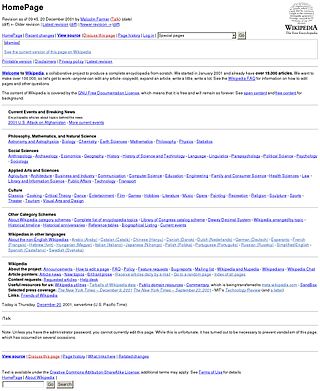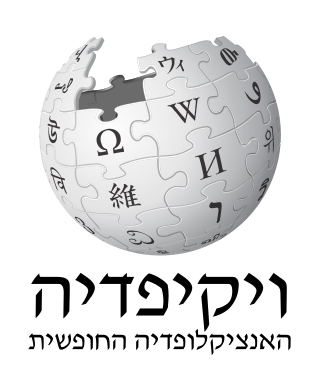Related Research Articles

Wikipedia began with its first edit on 15 January 2001, two days after the domain was registered by Jimmy Wales and Larry Sanger. Its technological and conceptual underpinnings predate this; the earliest known proposal for an online encyclopedia was made by Rick Gates in 1993, and the concept of a free-as-in-freedom online encyclopedia was proposed by Richard Stallman in 1998.
A blog is an informational website published on the World Wide Web consisting of discrete, often informal diary-style text entries (posts). Posts are typically displayed in reverse chronological order so that the most recent post appears first, at the top of the web page. Until 2009, blogs were usually the work of a single individual, occasionally of a small group, and often covered a single subject or topic. In the 2010s, "multi-author blogs" (MABs) emerged, featuring the writing of multiple authors and sometimes professionally edited. MABs from newspapers, other media outlets, universities, think tanks, advocacy groups, and similar institutions account for an increasing quantity of blog traffic. The rise of Twitter and other "microblogging" systems helps integrate MABs and single-author blogs into the news media. Blog can also be used as a verb, meaning to maintain or add content to a blog.
Electronic publishing includes the digital publication of e-books, digital magazines, and the development of digital libraries and catalogues. It also includes the editing of books, journals, and magazines to be posted on a screen.
Open-source journalism, a close cousin to citizen journalism or participatory journalism, is a term coined in the title of a 1999 article by Andrew Leonard of Salon.com. Although the term was not actually used in the body text of Leonard's article, the headline encapsulated a collaboration between users of the internet technology blog Slashdot and a writer for Jane's Intelligence Review. The writer, Johan J. Ingles-le Nobel, had solicited feedback on a story about cyberterrorism from Slashdot readers, and then re-wrote his story based on that feedback and compensated the Slashdot writers whose information and words he used.
Pay-per-click (PPC) is an internet advertising model used to drive traffic to websites, in which an advertiser pays a publisher when the ad is clicked.

Hebrew Wikipedia is the Hebrew language edition of Wikipedia. This edition was started on 8 July 2003 and contains more than 336,000 articles as of June 2023.

The Italian Wikipedia is the Italian-language edition of Wikipedia. This edition was created on May 11, 2001, and first edited on June 11, 2001. As of June 16, 2023, it has 1,814,871 articles and more than 2,394,303 registered accounts. It is the 9th-largest Wikipedia by the number of articles.

Yated Ne'eman is a semi-major Israeli daily Hebrew language newspaper based in Bnei Brak. The Hebrew edition is published daily except on the Jewish Sabbath. A weekly English language edition was published in Israel and distributed in Israel, South Africa and Britain until December 2006.

In computing, a news aggregator, also termed a feed aggregator, feed reader, news reader, RSS reader, or simply an aggregator is client software or a web application that aggregates syndicated web content such as online newspapers, blogs, podcasts, and video blogs (vlogs) in one location for easy viewing. The updates distributed may include journal tables of contents, podcasts, videos, and news items.

Arutz Sheva, also known in English as Israel National News, is an Israeli media network identifying with religious Zionism. It offers online news articles in Hebrew, English, and Russian as well as live streaming radio, video and free podcasts. It also publishes a weekly newspaper, B'Sheva, with the third-largest weekend circulation in the country.
Project Syndicate is an international media organization that publishes and syndicates commentary and analysis on a variety of global topics. All opinion pieces are published on the Project Syndicate website, but are also distributed to a wide network of partner publications for print. As of 2019, it has a network of 506 media outlets in 156 countries.

Open Journal Systems, also known as OJS, is an open source and free software for the management of peer-reviewed academic journals, created by the Public Knowledge Project, and released under the GNU General Public License.

The mass media in Israel refers to print, broadcast and online media available in the State of Israel. The country boasts dozens of newspapers, magazines, and radio stations, which play an important role by the press in political, social and cultural life and cater it to a modern, developed and literate society.
MailOnline is the website of the Daily Mail, a tabloid newspaper in the United Kingdom, and of its sister paper The Mail on Sunday. MailOnline is a division of dmg media, which is owned by Daily Mail and General Trust plc.

A paywall is a method of restricting access to content, with a purchase or a paid subscription, especially news. Beginning in the mid-2010s, newspapers started implementing paywalls on their websites as a way to increase revenue after years of decline in paid print readership and advertising revenue, partly due to the use of ad blockers. In academics, research papers are often subject to a paywall and are available via academic libraries that subscribe.

Examiner.com was an American news website based in Denver, Colorado, that operated using a network of "pro-am contributors"' for content. It had various local editions with contributors posting city-based items tailored to 238 markets throughout the United States and parts of Canada in two putative national editions, one for each country.
Defense Update is an online defense magazine published by Lance & Shield Ltd. from Israel.

The Times of Israel is an Israeli multi-language online newspaper that was launched in 2012. It was co-founded by Israeli journalist David Horovitz, who is also the founding editor, and American billionaire investor Seth Klarman. Based in Jerusalem, it "documents developments in Israel, the Middle East and around the Jewish world." Along with its original English site, The Times of Israel publishes in Hebrew, Arabic, French, and Persian. In addition to publishing news reports and analysis, the website hosts a multi-author blog platform.
90min is a technology-enabled football news platform, which produces Internet content covering various football leagues. The content offered by the platform is user-generated following the principles of citizen journalism. The first London based company website was launched in 2011 as FTBpro.com by Israeli entrepreneurs Yuval Larom, Asaf Peled, and Gilad Beiman.
Hamichlol is a censored wiki-based Internet encyclopedia project for the Haredi public. Most of the articles on the site are exact copies of articles from the Hebrew Wikipedia or re-edited versions of Hebrew Wikipedia articles, adapted for the Haredi reader, while original articles currently constitute only a small portion of all the articles on the site. The site is managed and operated by the Institute for Literacy and Proper Knowledge, which was established for the purpose of creating the site.
References
- ↑ "ArticlesBase: The Profitable Content Farm With 20M Monthly Visitors You Don't Know". Techcrunch.com. 2011-02-11. Retrieved 2014-08-03.
- 1 2 ArticlesBase homepage statistics